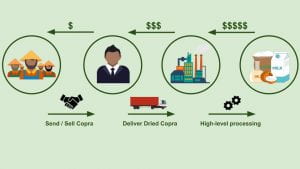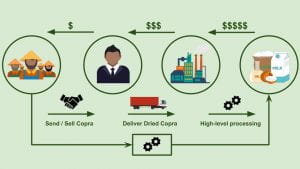Samantha Powers
Living an Impact-Focused Life
What’s your Why?
I believe I was put on this earth to:
- create impact by using my resources and abilities to help others
My purpose is to:
- recognize issues in the world and act to create positive change
I believe (my core values):
- Empathy
- Honesty
- Respect
The one thing I must do before I die is:
- explore other cultures
My advocates and supporters all believe I:
- Have the ability to create positive change guided by my skillset and empathy
The evil I want to eradicate in this world is:
- Acts done out of greed for money and power
- Evil that facilitates industries like human trafficking
I want to work in order to:
- Provide for myself and my family while fulfilling my purpose to create positive impact
Walk the Talk – Your How
If you are truly committed to your Why, you show it in your everyday behavior. It is all air until you do it. Working from your Why, How do you prove that you are true to your Why in all you do?
I always:
- Seek opportunities to help others
- Treat others with respect and kindness
- Am open and attentive to the ideas or thoughts of others
- Value differences in thought and culture
I never:
- Treat others with disrespect because of differences
- Am passive when I see an issue needing attention
- Am narrow-minded
My work style is:
- Detail-oriented
I try to treat people:
- With respect
- With kindness
I approach problems by:
- Clearly defining the issue
- Gaining all contextual knowledge surrounding the problem
- Considering all stakeholders
- Generating my own ideas and hearing thoughts from others
- Taking action to implement ideas
Victories are time to:
- reflect
If another attacks my point of view I:
- Listen to their view and acknowledge their points while explaining the reason behind my own
If I fundamentally do not agree with what an organization or person is doing, I will:
- Try to speak with others in the organization or the person directly to express my views. If we still do not see eye to eye and it is very important that we do to continue working together, I may dissociate from the person or organization.
Your Credibility – Your Whats
You have just spent some considerable time at Lehigh, and specifically in the Global Social Impact Fellowship, on many whats. Your whats include lab research, formal presentations, writing research papers, engaging with people in other cultural contexts, building prototypes, designing and building systems, raising funds, hiring employees, etc. The whats you have collected along the way are critical to your credibility when you are entering the workforce or applying to the best graduate and professional schools. They signify a credible currency to which organizations can assign value. Create a list of your Whats that are truly reflective of your Why & How. You did these things because you believe (Why) and you acquired them in the following (How) manner. These are examples you can use in interviews.
| What Have I Done | List of Experiences, Accomplishments, and Lessons Learned |
| Degrees, Minors, Certificates, Fellowships |
Financial Engineering Yellow Belt Certification Global Social Impact Fellowship |
| Research Experiences
|
Global Social Impact Fellowship
Mountaintop Summer Experience
|
| Inventions and Innovations
|
N/A |
| (Social) Entrepreneurial Ventures
|
Project Copra
|
| Publications
(Formal and Informal)
|
N/A
|
| Formal Presentations
(at Lehigh and Beyond)
|
Mountaintop Summer Experience
Global Social Impact Fellowship |
| Awards and
External Recognition
|
N/A
|
Articulating and learning from GSIF-related Experiences. For each of these prompts, we want you to identify one and only one specific and compelling event/incident/experience/moment and identify exactly how you grew personally and professionally through that moment.
| Teamwork Experience
(and Lessons Learned)
|
The first time each sub-team came together as one cohesive team to create a presentation last semester, I remember feeling as though we did not accomplish what I thought we would because we spent a significant amount of time updating each other rather than getting work done. However, this was necessary and I learned that I need to practice patience and better communicate plans with my teammates so I know what to expect during meetings.
|
| Conflict Resolution Experience
(and Lessons Learned) |
While making the final presentation as one large team last semester, we had small disagreements about things like how the presentation should look and what information we should include. These types of disagreements can be difficult to handle since you want to resolve them quickly to move on while still making sure everyone feels as though their voice is heard. In these situations, each member who wanted to would briefly explain their reasoning for their stance on the issue and we would usually proceed with the majority’s side.
|
| Leadership Experience
(and Lessons Learned)
|
Throughout the Global Social Impact Fellowship, our team rotated the leadership position. When I was team leader, I facilitated communication between sub-teams and advisors. I also created the agenda for each team meeting for which I was leader and I directed the discussion during the meetings to ensure the team stayed on topic and was timely in addressing each item of the meeting. This experience strengthened my leadership and interpersonal skills.
|
| Dealing with Chaos, Ambiguity, and Uncertainty (and Lessons Learned) | With the state of the world’s current environment, our team had trouble leveraging connections in the Philippines to speak to farmers and other potential stakeholders. Though this hindered our progression, it taught us that sometimes we need to accept what we cannot control and look for other ways to move forward when there are obstacles.
|
| Personally Challenging Experience (and Lessons Learned)
|
Since GSIF relies on the self-discipline of the students to get valuable work done, it took some adjusting to properly allocate weekly time dedicated to the project since it is so different than simply completing an assignment for a class by a specific deadline. Through the nature of the fellowship, I gained better time management skills that I can carry with me throughout the rest of my professional experiences.
|
| Cross-cultural Experience (and Lessons Learned)
|
When first meeting with the UPD team, I was surprised to see the UPD team show up an hour late after our GSIF class. It seemed as though they were very relaxed with their time and did not find it abnormal to show up at a different time than planned. Through this experience, I learned to be conscious of others’ tendencies that may or may not simply be a result of their cultural environment.
|
| An experience that helped you connect your GSIF work to your discipline / major.
|
Though our project was not at the stage to create a definite financial model last semester, I enjoyed creating the financial model as it was an instance that I saw a clear crossover between GSIF and my major.
|
| A moment that boosted your sense of agency and self-efficacy – you felt like you can speak for yourself, get stuff done, take on the world and make it better.
|
Participating in Mountaintop virtually boosted my sense of self-efficacy because it showed me that I can produce valuable work even when the environment is not ideal for working in groups. Despite not being physically together to work on the project, the summer experience proved to me that I can adapt to changes and successfully work in different environments. |
| A moment where you felt like you truly have a strong sense of purpose and belonging in this dynamic, globalized interdependent world.
|
Hearing from speakers during Mountaintop was very inspiring and made me feel motivated in my purpose on the project. Their experiences were very encouraging and made me feel engaged in a way that I do not usually feel in the typical classroom environment. |




